|
|
|
Sort Order |
|
|
|
Items / Page
|
|
|
|
|
|
|
| Srl | Item |
| 1 |
ID:
068297
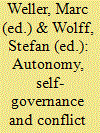

|
|
|
|
|
| Publication |
London, Routledge, 2005.
|
| Description |
xi, 276p.
|
| Standard Number |
0415339863
|
|
|
|
|
|
|
|
|
|
|
|
Copies: C:1/I:0,R:0,Q:0
Circulation
| Accession# | Call# | Current Location | Status | Policy | Location |
| 051005 | 320.15/WEL 051005 | Main | On Shelf | General | |
|
|
|
|
| 2 |
ID:
082070
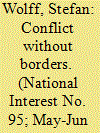

|
|
|
| 3 |
ID:
072384
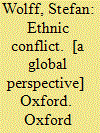

|
|
|
|
|
| Publication |
Oxford, Oxford University Press, 2006.
|
| Description |
xv, 220p.
|
| Standard Number |
0192805878
|
|
|
|
|
|
|
|
|
|
|
|
Copies: C:1/I:0,R:0,Q:0
Circulation
| Accession# | Call# | Current Location | Status | Policy | Location |
| 051337 | 305.8/WOL 051337 | Main | On Shelf | General | |
|
|
|
|
| 4 |
ID:
098816
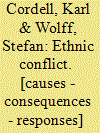

|
|
|
|
|
| Publication |
Malden, Polity Press, 2009.
|
| Description |
vi, 232p.
|
| Standard Number |
9780745639314
|
|
|
|
|
|
|
|
|
|
|
|
Copies: C:1/I:0,R:0,Q:0
Circulation
| Accession# | Call# | Current Location | Status | Policy | Location |
| 055215 | 305.8/COR 055215 | Main | On Shelf | General | |
|
|
|
|
| 5 |
ID:
095116
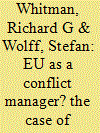

|
|
|
|
|
| Publication |
2010.
|
| Summary/Abstract |
This article offers an analysis of the EU's engagement in Georgia as a standpoint from which to assess the EU's role as a conflict manager. The article begins with a brief narrative account of the development of EU-Georgia relations in the context of the country's two unresolved conflicts over Abkhazia and South Ossetia. It then proceeds to the analysis of two sets of factors-those within, and those external to, the EU-that are crucial for understanding the nature and impact of EU efforts to manage the two Georgian conflicts. On the basis of this case-study analysis, the authors offer a wider analysis of the EU's potential for assuming a wider role as an international security actor. This is undertaken by considering both the limitations of the EU's existing capabilities for conflict resolution and the new developments contained within the Lisbon Treaty. The final part of the article asserts that the EU has suffered from two key weaknesses that have prevented it from living up to its aspirations of becoming a globally significant and effective conflict manager. The first is structural-the lack of, to date, a permanent External Action Service; the second is conceptual-the lack of a coherent and comprehensive conflict management strategy. The article concludes with five substantive principles that should guide the EU's approach to conflict management.
|
|
|
|
|
|
|
|
|
|
|
|
|
|
|
|
| 6 |
ID:
114742
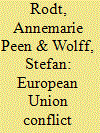

|
|
|
|
|
| Publication |
2012.
|
| Summary/Abstract |
Following a brief overview of the European Union's (EU) conflict management 'history', this article discusses the evolution of EU capabilities throughout the Union's involvement in the Western Balkans since the early 1990s. This is followed by a detailed case study of the EU intervention in Macedonia - Operation Concordia - and the contextual factors of that conflict, which shaped the outcomes of the EU's military efforts there. We conclude from this that the EU, alongside its partners in and beyond Macedonia, successfully prevented a likely civil war in the country in 2001, because the Union had a clearly defined set of interests, shared across institutions and member states, and interests that matched those of the main political players in Macedonia. This translated into sufficient political will to deploy sufficient military capabilities suited to the context of conflict management in Macedonia. However, we remain cautious as to whether the Union can muster similar levels of political will as well as the necessary capabilities to achieve the same elsewhere in the world.
|
|
|
|
|
|
|
|
|
|
|
|
|
|
|
|
| 7 |
ID:
099904
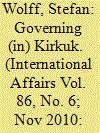

|
|
|
|
|
| Publication |
2010.
|
| Summary/Abstract |
This article focuses on the dynamics of the process of settling the status of Kirkuk, principally within the framework of the current Iraqi constitution of 2005 and the United Nations Assistance Mission for Iraq proposals of 2009, taking into consideration the broader local, national, regional and international context in which such a settlement has to be achieved. The article proceeds in four steps. Beginning with a conceptual clarification of the stakes and remedies associated with territorial disputes, it gives a broad overview of the three principal forms in which such disputes occur and illustrates this with pertinent examples of past disputes and their settlement, using this as an empirical basis for discussing the general dimensions of territorial dispute settlements and the factors that determine their precise nature in different cases. This is the background against which the following section contextualizes the situation in Kirkuk. Based on personal interactions with key interlocutors from all of Kirkuk's communities and key Iraqi and external players and analysts, the article examines the three (im-) balances of grievances, demands and power in and around Kirkuk that are essential for understanding the dynamic underlying any efforts to resolve the dispute in and over the province. Taking as a baseline the options currently available under the 2005 constitution of Iraq and the recommendations of the 2009 UN Report on Disputed Territories, it offers some observations on areas of possible compromise centred on power sharing in Kirkuk and status of Kirkuk vis-à-vis Baghdad and Erbil.
|
|
|
|
|
|
|
|
|
|
|
|
|
|
|
|
| 8 |
ID:
057917
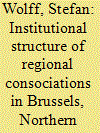

|
|
|
| 9 |
ID:
108111
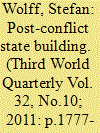

|
|
|
|
|
| Publication |
2011.
|
| Summary/Abstract |
A significant theoretical and empirical question underlying much of the literature on post-conflict state building is which institutions offer the best prospect for peace and democracy in divided societies recovering from conflict. This debate is highly relevant for many developing countries. With much invested by third parties in post-conflict reconstruction and a mixed track record of success at best, the question explored by this article is whether consociational institutional designs-widely applied in policy practice and severely criticised in academic discourse-can accomplish the twin goals of peace and democracy in divided post-conflict societies. Examining the claims of supporters and detractors of consociationalism, the article finds substantial conceptual and empirical evidence that consociational institutions hold significant promise for building democratic states after conflict in divided societies.
|
|
|
|
|
|
|
|
|
|
|
|
|
|
|
|
| 10 |
ID:
174239
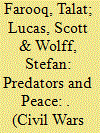

|
|
|
|
|
| Summary/Abstract |
Did US drone strikes cause the unravelling of the Pakistani conflict settlement process between the government and the TTP in 2013-14? In answering this question, we present strong, fieldwork-based evidence that the effects of leadership decapitation, civilian casualties, and loss of legitimacy and credibility as a negotiation partner by both the government and the TTP interacted in the context of specific social, political and cultural characteristics of a tribal society. We find that drone strikes ‘produced’ some of these factors, but not all, which allows us to conclude with four concrete policy recommendations for rethinking the use of drones.
|
|
|
|
|
|
|
|
|
|
|
|
|
|
|
|
| 11 |
ID:
114737
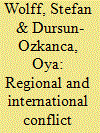

|
|
|
|
|
| Publication |
2012.
|
| Summary/Abstract |
There is considerable case-specific and anecdotal evidence of the impact of international organisations in conflict regulation, but conceptual frameworks and systematic comparative research are lacking. We begin by categorising different strategies of regional and international conflict regulation and then offer one possible macro-framework to account for its success or failure. This framework combines a focus on factors internal to the relevant organisation (i.e. its capabilities to act, fund and coordinate and cooperate) with an analysis of the conflict context (at the local, state, regional and global level). We find six factors to be particularly important: availability of resources and willingness to deploy them to strategic effect, commonality of interest among member states or a lead nation/s, long-term and continuously sustained conflict regulation efforts rather than ad hoc/on and off crisis management, effective external cooperation with major partners, a permissive conflict context and local interest in ending rather than continuing the conflict.
|
|
|
|
|
|
|
|
|
|
|
|
|
|
|
|
| 12 |
ID:
105635
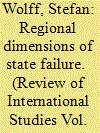

|
|
|
|
|
| Publication |
2011.
|
| Summary/Abstract |
The academic and policy debate on state failure reaches back to the early 1990s. Since then, its empirical and analytical sophistication has grown, yet the fact that state failure is a regional phenomenon, that is, that it occurs in clusters of geographically contiguous states, has largely been overlooked. This article first considers the academic and policy debates on state failure in the Political Science/International Relations and Development Studies literatures, and offers a definition of state failure that is derived from the means of the state, rather than its ends. Subsequently engaging with existing scholarship on the concept of 'region' in international security, the article develops a definition of 'state failure regions'. Further empirical observation of such regions and additional conceptual reflections lead to establishing an analytical model for the study of state failure regions and allow indentifying a number of concrete gains in knowledge and understanding that can result from its application.
|
|
|
|
|
|
|
|
|
|
|
|
|
|
|
|
| 13 |
ID:
104401
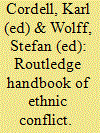

|
|
|
|
|
| Publication |
London, Routledge, 2011.
|
| Description |
xvi, 334p.
|
| Standard Number |
9780415476256, hbk
|
|
|
|
|
|
|
|
|
|
|
|
Copies: C:1/I:0,R:1,Q:0
Circulation
| Accession# | Call# | Current Location | Status | Policy | Location |
| 055988 | 305.8/COR 055988 | Main | On Shelf | Reference books | |
|
|
|
|
| 14 |
ID:
122774
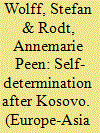

|
|
|
|
|
| Publication |
2013.
|
| Summary/Abstract |
This article discusses the meaning of self-determination in its historical and contemporary contexts and examines the different options available for the accommodation of contested self-determination claims. Among these, the creation of a new state, arguably, is the most radical of options and one that has significant regional and global implications beyond the territory to which it is applied. Detailing these implications in relation to the case of Kosovo, we make a broader argument that, even if secession is one mechanism to resolve self-determination disputes, this does not do away with the need to continue exploring settlements short of secession as alternatives to changing established international boundaries.
|
|
|
|
|
|
|
|
|
|
|
|
|
|
|
|
| 15 |
ID:
122173
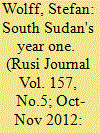

|
|
|
|
|
| Publication |
2012.
|
| Summary/Abstract |
A year after independence, continuing tension with the North is not the only challenge facing South Sudan. From the uncertain fate of the disputed territory of Abyei and crossborder inter-communal conflicts, to a lack of economic infrastructure and food insecurity, combined with a persistent failure to build successful institutions, South Sudan's beginning as an independent state is rife with dangers. Stefan Wolff outlines the historical background and the security, political, ethnic and socioeconomic questions the South Sudanese leadership still needs to resolve.
|
|
|
|
|
|
|
|
|
|
|
|
|
|
|
|
| 16 |
ID:
145941
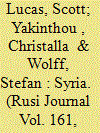

|
|
|
|
|
| Summary/Abstract |
Despite its extreme fragility, the ceasefire in place in Syria since February 2016 has afforded the opportunity to assess the options for a set of interim governance and transitional justice arrangements. These could establish the foundations for a transition following the conclusion of the Syrian civil war, regardless of its endpoint. Drawing on the specifics of the Syrian case and wider studies of interventions in, and transitions from, civil war, Scott Lucas, Christalla Yakinthou and Stefan Wolff consider the challenges of peace- and state-building, identifying both risks and mitigating actions. The article argues that risk mitigation is possible and should begin now. These efforts need to be supported by the international community in order to lay the foundations for a credible and sustainable post-civil war transition in Syria.
|
|
|
|
|
|
|
|
|
|
|
|
|
|
|
|
|
|
|
|
|